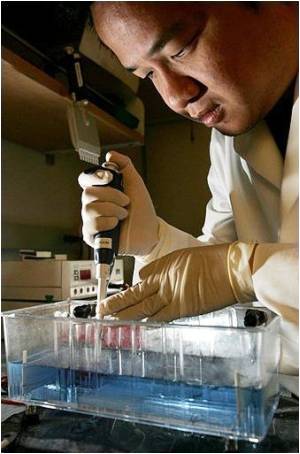Research has shown that the road to type 2 diabetes is paved with insulin resistance

Investigators in the laboratory of C. Ronald Kahn, M.D., began with two existing strains of mice that are on opposite sides of the spectrum for insulin resistance.
"The ‘B6'' mouse is very prone to develop both obesity and diabetes, and the ‘129'' mouse is quite protected from both, even if it possesses a genetic defect in insulin signaling," says Dr. Kahn, who is the Mary K. Iacocca Professor of Medicine at Harvard Medical School. "Comparing the two models, it''s as if there''s an on/off switch for insulin resistance and diabetes between them. We reasoned that if we could find out the differences between B6 and 129 mice, we could identify a factor that could be a major modifier of insulin resistance, and a good drug target for treatment of type 2 diabetes."
In previous work, the Kahn lab created a genetic cross between these two mice models, did a genome-wide screening and found an area on mouse chromosome 14 that appeared to be important for insulin sensitivity. In the latest paper, published online in the Journal of Clinical Investigation, they followed up and found that PKC-delta stood out in activity among the genes in that region.
The researchers then showed that levels of the PKC-delta enzyme were about two times as high in the liver and other tissues in the B6 as in the 129 mouse. When both types were put on high-fat diets, levels of the enzyme stayed the same in the 129 mouse but rose to three times higher in the B6 mouse.
Could these differences be enough to make the profound change in insulin sensitivity? The scientists next created three new mice models to check.
Advertisement
In short, PKC-delta levels correlated closely with insulin resistance and the abnormalities in glucose tolerance in all three cases of mice. In addition, the insulin resistance correlated with increased fat in the liver, an increasing problem in people with insulin resistance.
Advertisement
Overall, "drugs that inhibit the activity of PKC-delta in the liver and other tissues potentially could aid treatments for diabetes and fatty liver disease, which is second only to alcohol as a cause of liver failure," Dr. Kahn says.
Lead author on the paper is Olivier Bezy. Other contributors include Thien T. Tran, Ryo Suzuki, Brice Emanuelli, Jonathan Winnay, Marcelo A. Mori, Joel Haas, Sudha B. Biddinger, Allison B. Goldfine, Mary-Elizabeth Patti, and George L. King from Joslin; Jussi Pihlajamäki from the University of Eastern Finland and Kuopio University Hospital in Finland; and Michael Leitges from the University of Oslo in Norway. The research was supported by the National Institutes of Health, the American Diabetes Association and the Mary K. Iacocca Professorship.
Source-Newswise















